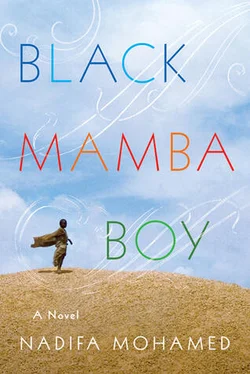Bethlehem giggled nervously and pushed him away. “Why don’t I cut this too-long hair of yours? I am meant to be the one with the big hair, aren’t I?”
Jama nodded and grabbed his rababa, singing wedding songs while she scrambled around in her bag. Bethlehem had come prepared with a large pair of scissors, and she hacked away at his hair until he looked like the young man who had stolen her heart in her father’s shop.
“There, you are beautiful again,” sighed Bethlehem.
Jama laughed. “You think I’m beautiful?”
“You are the most beautiful man in Gerset! And maybe even in all of Eritrea. My sisters are so jealous that I captured you.”
“Ya salam! What flattery!”
“By Mary, it is the truth. I will never let you escape from me.”
“And I will never let you escape from me, I will bury my heart under your feet. Come, let me show you something.”
Jama led Bethlehem outside the tukul. The landscape was lit by a full moon, Gerset serene and hopeful, a night breeze rustling through the trees. “You see that star up there, the flickering one? Every night before you go to sleep I want you to look up at it and send me a kiss, and wherever I am, I will also look for it and send you a kiss. Don’t forget, Bethlehem, don’t stop until I get back.”
“I won’t forget,” said Bethlehem, squeezing his waist.
“Let’s go back inside,” Jama said, taking her hand. She followed him through the low entrance and with a big breath blew out the candle.
SUDAN, EGYPT, AND PALESTINE, DECEMBER 1946
The train cut through nowhere, hurtling past virgin desert. It was British-made and inferior to the gliding Italian railway from Asmara, thrown down in haste by soldiers who were hurrying to avenge the assassination of Gordon by the dervishes. Jama had hitched a ride on the back of a camel to Kassala train station, quiet and morose the whole way. Leaving the tukul at dawn, Bethlehem’s hair sprawled over his old mat, he had knelt down and stroked her sleeping face, trying to burn her features into his memory. He could only put his faith in the stars, that they would bring him back to her.
Jama had never paid attention to the route Somalis took to Egypt. They were broke, hungry men who passed through Tessenei on their way to Sudan, and most could not speak Arabic and were perpetually lost. Now he strained to remember what the more mature ones had said. “Iskandriya? Sandriya? What was the name of that place?”
He spoke to his neighbors on the train but they were all Sudanese traders returning home to Khartoum who knew nothing of Egypt; they cut him off as he tried to make conversation, and talked among themselves. Jama looked through the wire mesh that covered the windows and stared at the barren, treeless wilderness beyond the tracks. He bought roasted sesame from hawkers at a small station, and embarrassed by the arcs of sweat spreading under his arms, on his back, and in his groin, remained by the train. When his legs grew tired he returned to his carriage. The leather stuck to his skin and he discreetly undid the buttons on his shirt as he nestled back into his seat.
At every stop he stuck his head out the door, looked around, and asked boarding passengers, “Egypt?” Most sullenly shook their heads and hurried past him to find a seat. Hours later, after people had performed afternoon, sunset, and evening prayers in the cramped carriage, a man who had journeyed with Jama from Kassala called out, “You need to get off here for the train to Egypt.” Jama thanked him and raced off, holding his father’s suitcase tightly under his arm. Crowds were walking toward the station, where uniformed policemen stopped and searched them. Jama had never needed identification before, he had no paper saying who he was and where he belonged, but from now on, his abtiris would not be enough to prove his identity. In this society you were nobody unless you had been anointed with a stamp by a bureaucrat. Fearful of the policemen, he skipped down from the platform before it entered the Wadi Halfa terminal, ran around the station, and followed the curve of a great lake into Egypt. Jama walked all night, the water in the lake as black and glossy as tar, the surface occasionally rippled by a fish struggling free from a hook. Only somnolent fishermen noticed him hurrying by with a nervy step. He did not see any policemen as he crossed the border, so he stopped to rest, falling asleep by a brick dam spanning the width of the Nile. When he reached Aswan station, with its proud waving flags and severe columns, he quickly bought another ticket to take him north before a policeman emerged. The train from Aswan terminated in Cairo, and after a three-day journey on hard wooden benches he was dismayed to learn that he needed another train to take him to the great port of Al-Iskanderiya.
Nausea crawled up his throat as the train trundled past the tanneries on the fringes of Alexandria; the smell of dead flesh hanging in the air was exactly like that of the battlefields of Keren. Jama suddenly felt certain that the train would be bombed and go up in a terrible conflagration like the Italian supply trains. Sweat poured down his face and neck, while his heart pounded in irregular beats. Even after the train had slid along the bright blue sea and screeched into the station, Jama sat slumped in the seat like a feverish man, waiting for the panic to subside. He had thrown himself headlong into an intimidating, alien land and began to regret the distance he had put between himself and Bethlehem.
With days of sweat, sand, and dirt on him, Jama first went to the washroom and cleaned himself, scrubbing his shirt in a porcelain sink, the first he had ever used. The wet shirt clinging to him, Jama drifted out into the city, his slight body pushed around by the crushing mass of people outside the station. Jama gazed bedu-like at the beautiful buildings, at their fancy glass windows and colorful tiled façades, and floated along with the cool sea breeze toward the port. Huge cargo ships were gathered together, sounding their deep-throated horns again and again; he would later find out they were celebrating the Ferengi Christmas, earlier and shorter than Bethlehem’s. As Jama sat on a bench, tired beyond the point of sleep, a Somali boy approached and introduced himself. The street lamps gave his black Indian hair a strange reddish tint. Jama could barely make out what he was saying, he hadn’t heard Somali for months, but he followed him deliriously. Liban led him back to the fifth-floor apartment he shared with seventeen other Somali migrants and offered him a mattress for the night. Liban showed him the damp washroom and then disappeared to speak with his roommates. From the windows Jama could see over a swath of Alexandria, and as dusk fell, lights appeared magically as far as the eye could see, buzzing in the hot dark like a swarm of fireflies. He finally found Bethlehem’s star and sleepily sent a kiss to it. He grabbed a mattress, pushed the suitcase under his head and kept hold of it as he slept.
In the morning Liban took Jama around their neighborhood. The apartment was in the Street of Seven Girls, a street of rioters and pimps, notorious for the men, women, and children for sale behind its doors. Sailors, policemen, and local Ferengi merchants lurked lustfully in doorways. Alexandria was like the ancient harlot mother of Aden and Djibouti, who had grown rich and now put on airs and graces, but in dank, cobwebbed corners her truest colors were revealed. Jama watched the Arabs smoking shishas, the promenading Frenchwomen, the African waiters and doormen, Greek merchants, Jewish rabbis all moving in their orbits, creating a twentieth-century Babel. A tram scuttled past and Liban pulled Jama on board. From it they saw the heights and depths of Alexandria. Ships were lined up along the dock, more ships than Jama could remember ever seeing in Aden. Liban dragged him off the tram near a seaman’s store on the eastern harbor, where he pretended to be a sailor to buy a fivepenny box of cigarettes and encouraged Jama to do the same.
Читать дальше
Конец ознакомительного отрывка
Купить книгу












